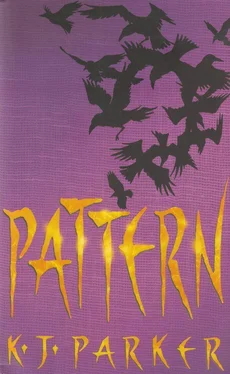K Parker - Pattern
Здесь есть возможность читать онлайн «K Parker - Pattern» весь текст электронной книги совершенно бесплатно (целиком полную версию без сокращений). В некоторых случаях можно слушать аудио, скачать через торрент в формате fb2 и присутствует краткое содержание. Жанр: Фэнтези, на английском языке. Описание произведения, (предисловие) а так же отзывы посетителей доступны на портале библиотеки ЛибКат.
- Название:Pattern
- Автор:
- Жанр:
- Год:неизвестен
- ISBN:нет данных
- Рейтинг книги:3 / 5. Голосов: 1
-
Избранное:Добавить в избранное
- Отзывы:
-
Ваша оценка:
- 60
- 1
- 2
- 3
- 4
- 5
Pattern: краткое содержание, описание и аннотация
Предлагаем к чтению аннотацию, описание, краткое содержание или предисловие (зависит от того, что написал сам автор книги «Pattern»). Если вы не нашли необходимую информацию о книге — напишите в комментариях, мы постараемся отыскать её.
Pattern — читать онлайн бесплатно полную книгу (весь текст) целиком
Ниже представлен текст книги, разбитый по страницам. Система сохранения места последней прочитанной страницы, позволяет с удобством читать онлайн бесплатно книгу «Pattern», без необходимости каждый раз заново искать на чём Вы остановились. Поставьте закладку, и сможете в любой момент перейти на страницу, на которой закончили чтение.
Интервал:
Закладка:
K J Parker
Pattern
Chapter One
He woke up out of a dream about faraway places, and saw smoke. It was hanging in the air, like mist in a valley, and his first thought was that the chimney was blocked again. But there was rather too much of it for that, and he could hear burning, a soft cackle of inaudible conversation in the thatch above his head, the scampering of rats and squirrels in the hayloft.
Beside him, his wife grunted and turned over. He nudged her hard in the small of the back, and hopped out of bed.
'Get up,' he said. 'The house is on fire.'
'What?' She opened her eyes and stared at him.
'The house is on fire,' he told her, annoyed at having to repeat himself in the middle of a crisis. 'Come on, for God's sake.'
She scrambled out and started poking about with her feet, trying to find her shoes. 'No time for that now,' he snapped, and unlatched the partition door. It opened six inches or so and stuck; someone lying against it on the other side. That wasn't good.
It occurred to him to wonder where the light was coming from, a soft, rather beautiful orange glow, like an hour before sunset in autumn. The answer to that was through the gap where the partition didn't quite meet the roof-it was coming through from the main room. Not good at all.
He took a step back from the door and kicked it, stamping sideways with the flat of his bare foot. The door moved a few more inches, suggesting that he was shifting a dead weight. He repeated the manoeuvre five times, opening a gap he could just about squeeze through.
'Come on,' he urged his wife-comic, as if they were going to a dance and she was fussing about her hair. Hilarious.
The main room was full of orange light, but there wasn't any air, just smoke. As he stepped through, the heat washed over him; it was like standing right up close to the forge, as you have to when you're waiting for a piece of iron to come up to welding heat, and you feel the outer edge of the fire soaking into your skin. He looked down to see what the obstruction had been, and saw Henferth the swineherd, rolled over on his side, dead. No need to ask what had killed him; the smoke was a solid wall of fuzzy-edged orange. Just in time, he remembered not to breathe in; he lowered his head and drew in the clean air inside his shirt. Where had he learned to do that?
Only six paces, diagonally across the floor, to the upper door; he could make that, and once the door was open he'd be out in cold, fresh air. The bar was in place, of course, and the bolts were pushed home top and bottom-he grabbed the knob of the top bolt and immediately let go as the heat melted his skin. Little feathers of smoke were weaving in through the minute cracks between the boards; the outside of the door must be on fire.
So what? Catching the end of his sleeve into the palm of his hand, he pushed hard against the bolt. It was stiff-heat expands metal-but he was in no mood to mess about, and his lungs were already tight; also, the smoke was making his eyes prickle. He forced the top bolt back with an apparently disproportionate amount of effort, ramming splinters into the heel of his hand from a rough patch of sloppily planed wood, then stooped and shot back the bottom bolt, which moved quite easily. That just left the bar; and he was already gasping out his hoarded breath as he unhooked it. Then he put his shoulder to the door and shoved.
It didn't move. He barged against it again, but this wasn't just an annoying case of a sticky door, damp swelling the exposed end grain. He was out of breath now, and there was no air, only smoke. Most men would've panicked; fortunately, he remembered something else he must have picked up somewhere (where?) and dropped to the floor. Right down low, cheek pressed to the boards, there was clean air, just enough for a lungful.
As he breathed in he was thinking, The door's stuck, why? He hadn't stopped to think, Why is the house on fire? If his mind had addressed the problem at all, it had assumed some accident-a glowing cinder lodged in the thatch, carelessness with a lamp. But the door wouldn't open, the wood was burning on the inside. He knew exactly what that meant.
Behind him, someone was coughing horribly. He recognised the cough (she had a weak chest, always woke up coughing in winter). 'Get down,' he hissed, wasting precious breath. 'On the floor.' He didn't look round to see if she was doing as she was told, or even if she'd understood him. Right now, time was calibrated in units of air, and he had very little of it left. Certainly not enough to fritter away on fear or other self-indulgent luxuries; there'd be plenty of opportunities for that kind of stuff later, when he wasn't so busy.
The axe, he thought; the big axe. Of course the door was too solid to break down-he'd made it himself, he was just too damn painstaking for his own good-but with the big axe he could smash out the middle panel, at least enough to make a hole to breathe through. Where was the big axe, he wondered; there was something wrong with his memory, maybe the smoke had got in it and spoiled it, like oil curdling milk. Then he remembered. The big axe was in the woodshed, where the hell else would the big axe be? Inside there was only the little hand-axe, and he might as well peck at the door with his nose like a woodpecker.
Something flopped down next to him and he felt a sharp, unbearable pain in his left foot and ankle. Burning thatch, the roof was falling in. Oh, he really didn't need that. 'Bench,' he yelled, emptying his lungs (like spilling water in the desert; and when had he ever been in the desert?), 'smash the door down with a bench.' But she didn't answer, in fact he couldn't hear her at all, not even that goddamned horrible rasping cough. Oh well, he thought, can't help that now (plenty of time for that later, as well) and it screws up the bench idea. Come on, brain, suggestions. There's got to be another way out of here, because I've got to get out. The other door, or what about the window? And if they're blocked too, there's the hatch up into the hayloft, and out the hayloft door-ten-foot drop to the ground, but it'd be better than staying here.
But the other door was forty feet away; the window was closer, but still impossibly far, and the hatch might as well have been on the other side of the ocean. There simply wasn't time to try, and if he stood up he'd suffocate in the smoke. The only possible place to be was here, cheek flat on the floorboards, trapped for the brief remainder of his life in half an inch of air.
Another swathe of burning thatch landed on him, dropping heavily across his shoulders. He felt his hair frizzle up before he felt the pain, but when it came it was too much to bear-he couldn't just lie still and feel himself burn. He snuffed up as much air as he could get-there was a lot of smoke in it, and the coughing cost him a fortune in time-and tried to get to his feet, only to find that they weren't working. Panic started to circle, like crows round a dead sheep, but he shooed it away as he lurched, overbalanced and fell heavily on his right elbow. The fire had reached his scalp and worked its way through his shirt to the skin on his back.
A man might be forgiven for calling it a day at this point, he thought; but he couldn't quite bring himself to do that, not yet. He'd be horribly burned, of course-he'd seen men who'd been in fires, their faces melted like wax-but you had to be philosophical about these things: what's done is done and what's gone is gone, salvage what you can while you can. Like his life, for instance. Yes, how about that?
It hadn't been so bad back in the inner room-why the hell had he ever left it, he wondered? Seemed like a good idea at the time. So he shrugged off the pain, like kicking away a yapping dog, and started to crawl back the way he'd just come. He made a good yard that way (the palm of his hand on his wife's upturned face; he knew the feel of the contours of her cheeks and mouth, from tracing them in the dark with his fingertips, tenderly, gently, like he meant it; but no air to waste on that stuff now) before the beam fell across his back and pinned him down, making him spill his last prudent savings of air. The pain-no, forget that for a moment, he couldn't feel his hands, even though he knew they were on fire, his back must be broken He tried to breathe in, but there was just smoke, no time left at all. Forget it, he thought, I can't be bothered with this any more.
Читать дальшеИнтервал:
Закладка:
Похожие книги на «Pattern»
Представляем Вашему вниманию похожие книги на «Pattern» списком для выбора. Мы отобрали схожую по названию и смыслу литературу в надежде предоставить читателям больше вариантов отыскать новые, интересные, ещё непрочитанные произведения.
Обсуждение, отзывы о книге «Pattern» и просто собственные мнения читателей. Оставьте ваши комментарии, напишите, что Вы думаете о произведении, его смысле или главных героях. Укажите что конкретно понравилось, а что нет, и почему Вы так считаете.












